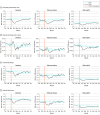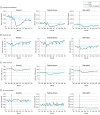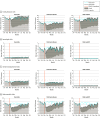Trends in Health Service Use for Canadian Adults With Dementia and Parkinson Disease During the First Wave of the COVID-19 Pandemic
- PMID: 35977228
- PMCID: PMC8903126
- DOI: 10.1001/jamahealthforum.2021.4599
Trends in Health Service Use for Canadian Adults With Dementia and Parkinson Disease During the First Wave of the COVID-19 Pandemic
Abstract
Importance: Persons with dementia and Parkinson disease (PD) are vulnerable to disruptions in health care and services.
Objective: To examine changes in health service use among community-dwelling persons with dementia, persons with PD, and older adults without neurodegenerative disease during the first wave of the COVID-19 pandemic.
Design setting and participants: Repeated cross-sectional analysis using population-based administrative data among community-dwelling persons with dementia, persons with PD, and adults 65 years and older at the start of each week from March 1 through the week of September 20, 2020 (pandemic period), and March 3 through the week of September 22, 2019 (historical period), in Ontario, Canada.
Exposures: COVID-19 pandemic as of March 1, 2020.
Main outcomes and measures: Main outcomes were weekly rates of emergency department visits, hospitalizations, nursing home admissions, home care, virtual and in-person physician visits, and all-cause mortality. Poisson regression models were used to calculate weekly rate ratios (RRs) with 95% CIs comparing pandemic weeks with historical levels.
Results: Among those living in the community as of March 1, 2020, persons with dementia (n = 131 466; mean [SD] age, 80.1 [10.1] years) were older than persons with PD (n = 30 606; 73.7 [10.2] years) and older adults (n = 2 363 742; 74.0 [7.1] years). While all services experienced declines, the largest drops occurred in nursing home admissions (RR for dementia: 0.10; 95% CI, 0.07-0.15; RR for PD: 0.03; 95% CI, 0.00-0.21; RR for older adults: 0.11; 95% CI, 0.06-0.18) and emergency department visits (RR for dementia: 0.45; 95% CI, 0.41-0.48; RR for PD: 0.40; 95% CI, 0.34-0.48; RR for older adults: 0.45; 95% CI, 0.44-0.47). After the first wave, most services returned to historical levels except physician visits, which remained elevated (RR for dementia: 1.07; 95% CI, 1.05-1.09; RR for PD: 1.10, 95% CI, 1.06-1.13) and shifted toward virtual visits. Older adults continued to experience lower hospitalizations. All-cause mortality was elevated across cohorts.
Conclusions and relevance: In this population-based repeated cross-sectional study in Ontario, Canada, those with dementia, those with PD, and older adults sought hospital care far less than usual, were not admitted to nursing homes, and experienced excess mortality during the first wave of the pandemic. Most services returned to historical levels, but virtual physician visits remained a feature of care. While issues of equity and quality of care are still emerging among persons with neurodegenerative diseases, policies to support virtual care are necessary.
Copyright 2022 Bronskill SE et al. JAMA Health Forum.
Conflict of interest statement
Conflict of Interest Disclosures: Dr Bronskill reported receiving grants from the Ontario Neurodegenerative Disease Research Initiative through the Ontario Brain Institute and Drs Bronskill and Vedel reported receiving a grant from the Canadian Institutes of Health Research (CIHR VR5-172692) during the conduct of the study. Dr Jones and Mr Harris reported postdoctoral and doctoral fellowships, respectively, from the Alzheimer Society of Canada during the conduct of the study. Dr Swartz reported receiving personal fees (administrative stipend) from the Ontario Brain Institute/Ontario Neurodegenerative Disease Research Initiative during the conduct of the study. No other disclosures were reported.
Figures



Similar articles
-
Visits to the emergency department by community-dwelling people with dementia during the first 2 waves of the COVID-19 pandemic in Ontario: a repeated cross-sectional analysis.CMAJ Open. 2022 Jul 5;10(3):E610-E621. doi: 10.9778/cmajo.20210301. Print 2022 Jul-Sep. CMAJ Open. 2022. PMID: 35790227 Free PMC article.
-
Impact of the COVID-19 Pandemic on Home Care Services Among Community-Dwelling Adults With Dementia.J Am Med Dir Assoc. 2021 Nov;22(11):2258-2262.e1. doi: 10.1016/j.jamda.2021.08.031. Epub 2021 Sep 6. J Am Med Dir Assoc. 2021. PMID: 34571041 Free PMC article.
-
A Population-Based Analysis of Diabetes-Related Care Measures, Foot Complications, and Amputation During the COVID-19 Pandemic in Ontario, Canada.JAMA Netw Open. 2022 Jan 4;5(1):e2142354. doi: 10.1001/jamanetworkopen.2021.42354. JAMA Netw Open. 2022. PMID: 34985514 Free PMC article.
-
Trends in health service use among persons with Parkinson's disease by rurality: A population-based repeated cross-sectional study.PLoS One. 2023 May 19;18(5):e0285585. doi: 10.1371/journal.pone.0285585. eCollection 2023. PLoS One. 2023. PMID: 37205650 Free PMC article.
-
Risk of aspiration pneumonia and hospital mortality in Parkinson disease: A systematic review and meta-analysis.Eur J Neurol. 2024 Dec;31(12):e16449. doi: 10.1111/ene.16449. Epub 2024 Sep 5. Eur J Neurol. 2024. PMID: 39236309 Free PMC article.
Cited by
-
Variations in long-term care home resident hospitalizations before and during the COVID-19 pandemic in Ontario.PLoS One. 2022 Nov 4;17(11):e0264240. doi: 10.1371/journal.pone.0264240. eCollection 2022. PLoS One. 2022. PMID: 36331926 Free PMC article.
-
EXploring Patterns of Use and Effects of Adult Day Programs to Improve Trajectories of Continuing Care (EXPEDITE): Protocol for a Retrospective Cohort Study.JMIR Res Protoc. 2024 Aug 30;13:e60896. doi: 10.2196/60896. JMIR Res Protoc. 2024. PMID: 39213024 Free PMC article.
-
Examining the immediate and ongoing impact of the COVID-19 pandemic on population-based estimates of dementia: a population-based time series analysis in Ontario, Canada.BMJ Open. 2023 Jan 13;13(1):e067689. doi: 10.1136/bmjopen-2022-067689. BMJ Open. 2023. PMID: 36639204 Free PMC article.
-
Trend control charts for multiple sclerosis case definitions.Int J Popul Data Sci. 2024 Apr 30;9(1):2358. doi: 10.23889/ijpds.v9i1.2358. eCollection 2024. Int J Popul Data Sci. 2024. PMID: 39620120 Free PMC article.
-
The impact of the early COVID-19 pandemic on healthcare system resource use and costs in two provinces in Canada: An interrupted time series analysis.PLoS One. 2023 Sep 8;18(9):e0290646. doi: 10.1371/journal.pone.0290646. eCollection 2023. PLoS One. 2023. PMID: 37682823 Free PMC article.
References
Publication types
MeSH terms
LinkOut - more resources
Full Text Sources
Medical

